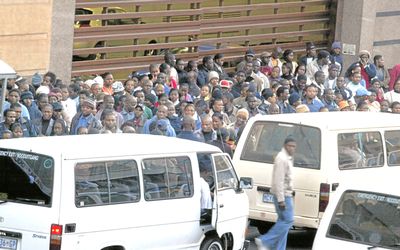Planning for taxis is good, but apply law now
by Paul Browning,
2016-03-15 05:47:45.0
IN AN earlier article (City bus-transit systems exhaust finances, March 8) I discussed how the costs of operation of integrated public transport networks were proving to be higher than income from fares, and suggested that attention should be given to the minibus taxi as the mode used by most public transport commuters.
This week and last, Business Day reported on moves to establish a transport authority for Gauteng. Delegates at a recent conference on the subject agreed that the minibus taxi should play an important role in the new authority to improve public transport in the province. Premier David Makhura, in opening the conference, was quoted as saying the new authority would help redefine the role of the taxi industry and enable it to provide a more business-oriented service.
So, the government is clearly planning for the future of the taxi. However, many will ask what is being done to improve the standards of taxi operation right here and now?
The daily experience of taxi commuters and other road users was graphically described by Transport Minister Dipuo Peters in a statement issued during October Transport Month last year: "While the majority of the taxi industry adhere to laws and regulations, it is quite disconcerting to concede that the clout and enormity of the taxi industry are damagingly undermined by the lawlessness and impunity with which some taxi operators and drivers intimidate commuters and other road users, brazenly violate traffic laws, and exhibit violent behaviour."
To tackle this lawlessness and impunity, "the minister calls on the provincial governments to tighten the licensing regime by punishing transgressors and rewarding good behaviour on the part of compliant operators and drivers".
The "licensing regime" is contained in the National Land Transport Act of 2009.
Anyone who wants to provide any kind of public transport service, from long-distance bus to urban minibus taxi, must apply for and be granted an operating licence appropriate to the service to be offered.
These licences are issued by the provincial regulatory authority on the advice of the municipal planning authority in which the service will operate. So, for example, Johannesburg effectively controls the number of taxi operating licences issued for services within its boundaries.
The very first requirement, therefore, is that the system should be enforced. Those taxis found to be operating without the necessary licence for that route should be impounded. Legal operators must, of course, ensure that their drivers obey the rules of the road, but here again, the operating licensing system offers a powerful tool.
The National Land Transport Act says that the taxi owner is equally liable for offences committed by his or her driver if the owner has not taken adequate steps to prevent such actions by training, management, monitoring, and so on. Repeated offences might see the operating licence suspended or withdrawn.
Taxi owners will protest that complying with these requirements will cost money they do not have.
A first step must, therefore, be to ensure they get all the money paid by commuters. In the current cash-based service, the driver has every incentive and opportunity to keep as much as he or she can of the fares paid. A ticketing system will ensure that the owner (the investor) gets all the income received from commuters. The resulting improvement in net income will allow the extra costs of legal compliance to be met, as well as improving profitability.
So, while we wait to see when the Gauteng transport authority will be established, and the part that the taxi might play in the integrated transport systems of the future, provincial and local governments should perhaps turn their attention to the public transport realities of today.
A critical element must be that of bringing greater order and financial sustainability to existing minibus-taxi operations.
• Browning is an independent public transport analyst

ON THE MOVE: Commuters queue for minibus taxis in Johannesburg. BAW South Africa plans to build the Inyathi minibus in South Africa. Picture: SUNDAY TIMES
IN AN earlier article (City bus-transit systems exhaust finances, March 8) I discussed how the costs of operation of integrated public transport networks were proving to be higher than income from fares, and suggested that attention should be given to the minibus taxi as the mode used by most public transport commuters.
This week and last, Business Day reported on moves to establish a transport authority for Gauteng. Delegates at a recent conference on the subject agreed that the minibus taxi should play an important role in the new authority to improve public transport in the province. Premier David Makhura, in opening the conference, was quoted as saying the new authority would help redefine the role of the taxi industry and enable it to provide a more business-oriented service.
So, the government is clearly planning for the future of the taxi. However, many will ask what is being done to improve the standards of taxi operation right here and now?
The daily experience of taxi commuters and other road users was graphically described by Transport Minister Dipuo Peters in a statement issued during October Transport Month last year: "While the majority of the taxi industry adhere to laws and regulations, it is quite disconcerting to concede that the clout and enormity of the taxi industry are damagingly undermined by the lawlessness and impunity with which some taxi operators and drivers intimidate commuters and other road users, brazenly violate traffic laws, and exhibit violent behaviour."
To tackle this lawlessness and impunity, "the minister calls on the provincial governments to tighten the licensing regime by punishing transgressors and rewarding good behaviour on the part of compliant operators and drivers".
The "licensing regime" is contained in the National Land Transport Act of 2009.
Anyone who wants to provide any kind of public transport service, from long-distance bus to urban minibus taxi, must apply for and be granted an operating licence appropriate to the service to be offered.
These licences are issued by the provincial regulatory authority on the advice of the municipal planning authority in which the service will operate. So, for example, Johannesburg effectively controls the number of taxi operating licences issued for services within its boundaries.
The very first requirement, therefore, is that the system should be enforced. Those taxis found to be operating without the necessary licence for that route should be impounded. Legal operators must, of course, ensure that their drivers obey the rules of the road, but here again, the operating licensing system offers a powerful tool.
The National Land Transport Act says that the taxi owner is equally liable for offences committed by his or her driver if the owner has not taken adequate steps to prevent such actions by training, management, monitoring, and so on. Repeated offences might see the operating licence suspended or withdrawn.
Taxi owners will protest that complying with these requirements will cost money they do not have.
A first step must, therefore, be to ensure they get all the money paid by commuters. In the current cash-based service, the driver has every incentive and opportunity to keep as much as he or she can of the fares paid. A ticketing system will ensure that the owner (the investor) gets all the income received from commuters. The resulting improvement in net income will allow the extra costs of legal compliance to be met, as well as improving profitability.
So, while we wait to see when the Gauteng transport authority will be established, and the part that the taxi might play in the integrated transport systems of the future, provincial and local governments should perhaps turn their attention to the public transport realities of today.
A critical element must be that of bringing greater order and financial sustainability to existing minibus-taxi operations.
• Browning is an independent public transport analyst
























Change: 0.83%
Change: 0.93%
Change: 0.95%
Change: 0.73%
Change: 1.91%
Data supplied by Profile Data
Change: 0.58%
Change: 0.43%
Change: 0.83%
Change: 0.00%
Change: 0.56%
Data supplied by Profile Data
Change: -1.65%
Change: -0.85%
Change: -0.55%
Change: -1.07%
Change: -0.35%
Data supplied by Profile Data
Change: 2.38%
Change: 1.99%
Change: 2.36%
Change: 2.65%
Change: 3.39%
Data supplied by Profile Data